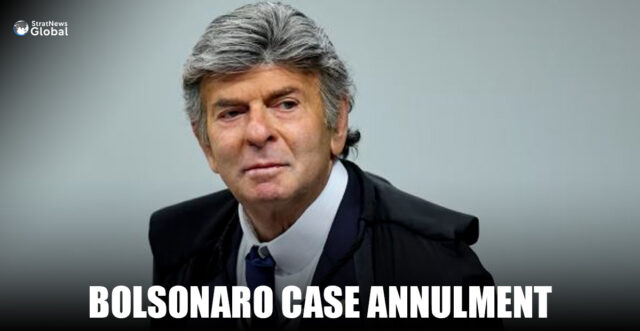Supreme Court Justice Luiz Fux voted to annul the case against former Brazilian President Jair Bolsonaro on Wednesday, citing improper jurisdiction, a move that set him apart from fellow justices and strengthened the chances of an appeal after this week’s verdict.
The high court still seems likely to convict Bolsonaro of plotting a coup to remain in power after he was voted out of office in 2022. Two judges already voted to convict, and the remaining two were appointed by leftist President Luiz Inacio Lula da Silva, who defeated Bolsonaro in the 2022 election.
But Fux’s vote could bolster the argument of Bolsonaro’s defence that the case should be decided by the high court’s full bench of 11 justices, including two who were appointed by the former president.
The divergence on the court adds tension to a case that has already polarized the nation and drawn thousands of Bolsonaro supporters to the streets in protest.
A lengthy appeals process would also push proceedings closer to the 2026 presidential campaign, in which Bolsonaro still insists he will be a candidate. The former president was barred from running for office in a separate case over his spreading of unfounded claims about Brazil’s electronic voting system.
The former president stands accused of taking part in an armed criminal organization, attempting to violently abolish democracy, organizing a coup, and damaging government property and protected cultural assets.
His lawyers have maintained his innocence on all counts and argued that his trial involved several procedural mistakes.
Fux’s Arguments
Fux agreed on Wednesday with several of the defence’s arguments. In his vote during the trial’s final deliberations, Fux said the case should have been heard by lower courts because Bolsonaro had left office.
“I vote … that the Supreme Court has no jurisdiction to judge this case because the defendants had already lost their (political) positions,” Fux said.
Once involved, he added, the full Supreme Court should have handled the trial rather than the five-judge panel, because it involves crimes committed while Bolsonaro was president.
Fux also said the defence was not given enough time to prepare their case, noting that the investigation generated around 70 terabytes of documents, which he called a “tsunami of data” and “document dumping.”
“I’m not an expert in this area, but the volume reached 70 terabytes — I couldn’t believe it, because that’s billions of pages. Yet it was only on April 30, 2025, that a decision was issued granting access to the media and materials seized during the investigative phase,” he said.
(With inputs from Reuters)





